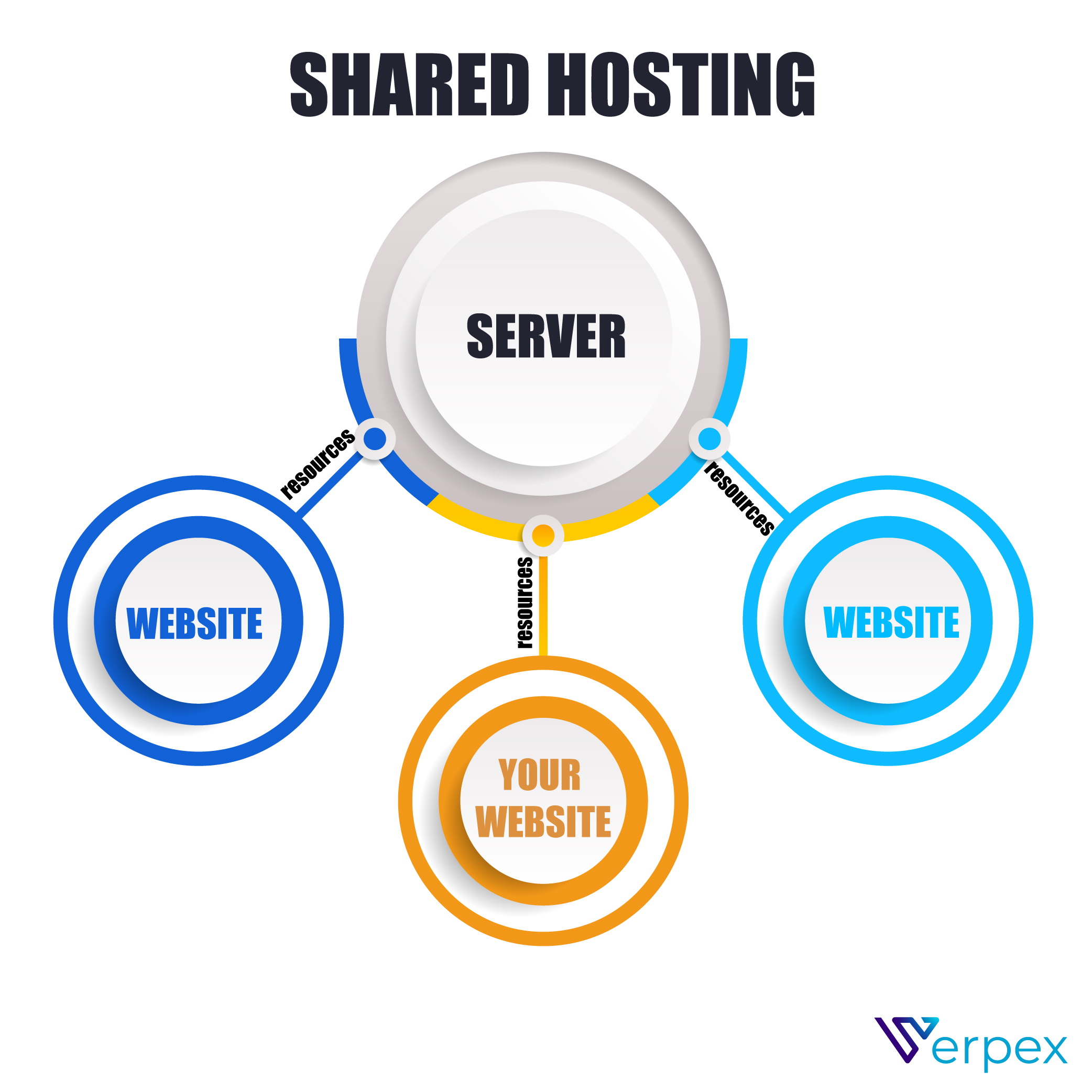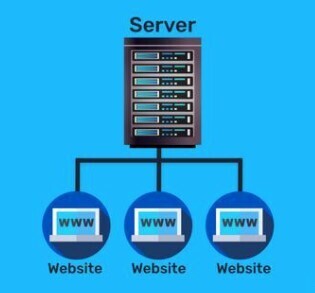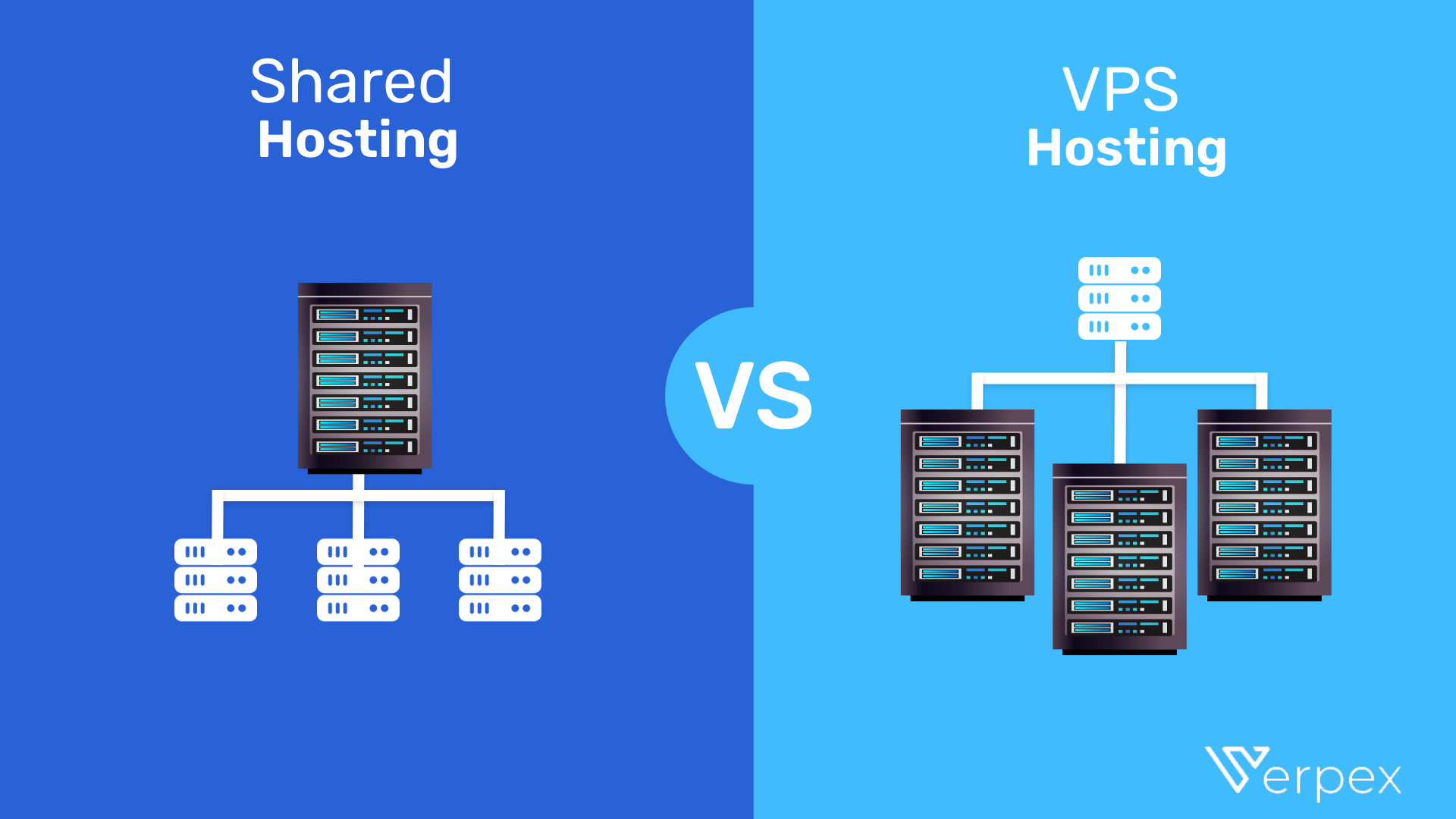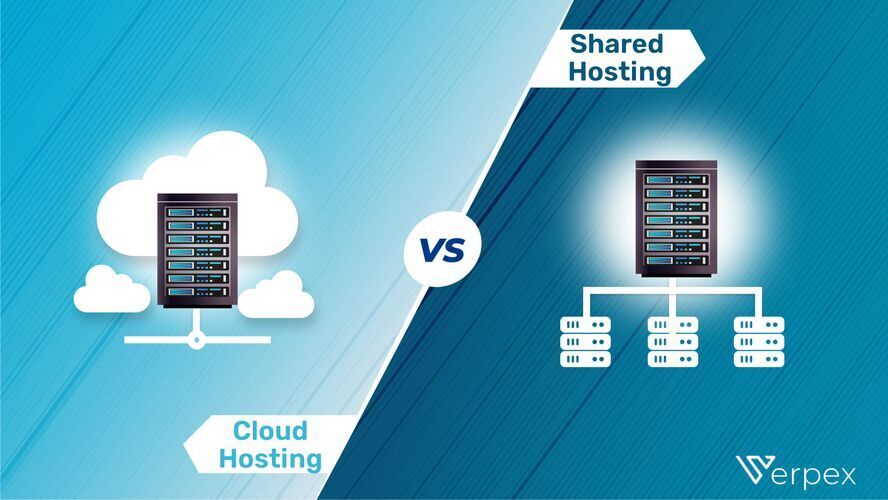If you’re launching a new website, whether it’s for a business or blog, then you’ll need web hosting. One of the most common types of web hosting is shared hosting. Shared hosting is so affordable and popular that in 2019, it reached 37.64% of the web hosting market share. Honestly, with 70% of the global population having mobile connectivity, by the year 2023, now is the time to get your site up and running.
Who you choose to host with, as a beginner, is extremely important, as you want to have a successful launch. In this article, we’ll dive in to explain what shared hosting is, some benefits of it, and even some pros and cons of shared hosting.
What Is Shared Hosting?
Shared hosting is one of the fastest and easiest ways to launch a new business website. According to Wikipedia, shared hosting is a type of web hosting service where you can host many websites on the same server. This is usually offered by web hosting companies, much like Verpex.

In a way, shared hosting is like renting your own piece of web space. With each shared hosting account, you receive a certain amount of:
- Disk space
- Bandwidth
- Email account creation
- And many other features
Disk space
Disk space is the amount of file storage you are allotted. Learn more about disk space in web hosting on our blog.
Bandwidth
Bandwidth is the amount of data or information that can be passed between your site or your visitors, to your web host and back. When you access a site, each piece of content like text, video, photos, or functions that are displayed using the database, all send a signal back and from you to your hosting account, that accumulates. For example, the larger the photo you have on a web page, the more bandwidth is used.
The amount of bandwidth you need for your website depends on its traffic - the number of page loads per day/per month your website gets.
Email account creation
Some shared hosting services include email services, and you can create email accounts. Some hosts have plans that limit the number of email accounts, and some offer unlimited email address creation.
And many other features
Some other features of shared hosting may be unlimited FTP account creation, auto-installer scripts for popular CMS, spam protection, free SSL, and much more. As a note, all shared hosting plans at Verpex come with free SSL.
How Does Shared Hosting Work?

Shared hosting provides an affordable platform by allowing people to rent small spaces of a server that is built to handle hundreds of websites at once. For new website owners, this is the smartest, fastest and the most affordable way to start a business site, and without worrying about maintaining a server.
The web host takes care of all of the technology, and gives you some tools to get started. Yep, that means you don’t need to worry about maintenance or technical issues as these are all taken care of by your host. Plus, you don’t need to be a web development whizz kid either because most platforms offer user-friendly website-building tools to get you started.
With shared hosting, you share resources like bandwidth with your new neighbors and there could be dozens, sometimes hundreds, of other sites on the server with you. Now the sharing doesn’t mean if someone else uses a lot, then your site will be down. There could be rare server-wide issues of sluggishness, but it is normally because you hit your allotted resources for your individual shared hosting account.
Is Shared Hosting Right For You?
If you’re a small business owner, whether you’re a blogger or running a restaurant or store, then shared hosting may be right for you. Most new small businesses choose shared hosting for several reasons:
- Small Budget to launch a new website.
- Easy and fast to start a website.
- Room to scale up in the future.
- Great for bloggers
Small Budget to launch a new website.
Many small business owners are on tight budgets and are attracted to the incredibly low start-up costs offered by shared hosting
Easy and fast to start a website.
Shared hosting offers website owners to easily and quickly launch a business online, giving entrepreneurs more time to focus on selling and making money.
Room to scale up in the future.
Shared hosting is just the beginning! If your site is growing beyond what it can handle in disk space or traffic, then you can upgrade to larger shared hosting accounts, or even beyond, like reseller hosting or managed server hosting.
Great for bloggers.
Shared hosting is great for bloggers, hobbyists and anyone else that doesn’t need huge data limits, and aren’t expecting a huge amount of traffic to their site.
Shared Hosting Is not Recommended for...
Shared hosting can be a great choice for most people, but there are some cases where it’s not recommended, like:
- If your website expects high volumes of visitors.
- If you need a very secure hosting while handling sensitive data or payment transactions.
- IP Reputation
- Not for developers who require root server access
If your website expects high volumes of visitors.
Since you’re sharing resources on a server, this can put a strain on your site, causing a slow down. Most web hosts do provide some resource limits for each shared hosting account, but there are some instances with website coding issues or massive traffic surges, that can make all of the sites on the same server sluggish.
If you need a very secure hosting while handling sensitive data or payment transactions.
At the hub level, every shared hosting company provides some level of security, but with hundreds of websites on a single server, sometimes things happen, including malware. If you’re running an ecommerce site and use a bank that has rigid requirements like PCI compliance, or if you’re handling very sensitive information, a shared hosting plan may not be ideal for you.
Some shared servers have a poor IP reputation.
Most new shared hosting customers aren’t aware of how important server IP reputation can be. This allows your site to not be blocked or blacklisted from search engines like Google or Bing. A poor IP reputation can affect your email deliverability if your shared hosting company includes email as a feature.
A lot of times, in order to find out if your shared hosting server’s IP reputation is good or bad, you can check places like SenderScore. If the score is poor, then you should contact your hosting company and work with them on how to fix the problem, or think about getting a dedicated IP for your shared hosting account.
Not for developers who require root server access
If you’re a developer, shared hosting doesn’t provide any root server access. You may have some SSH access, but strictly to the shared hosting account. You might even be limited to installing specific software too, or have to have the web host do it for you, for a small cost.
Pros and Cons of Shared Hosting
Pros
Cons
Pros of Shared Hosting
Cost
The great thing about shared hosting is that the cost is super affordable. Whether you’re a DIY hobbyist, a blogger, or even a small business, you can purchase shared hosting without burning a hole in your pocket. You can have a website up and running for as little as $1.25 per month.No technical knowledge needed
All the technical and security aspects are fully covered by your host. You won’t need to lift a finger in terms of maintenance.Easily scalable
If your website grows and receives more traffic, you can easily scale up your hosting plan and add more server space and bandwidth.Use multiple domains
Different shared hosting plans let you host multiple different domains at once. This means that you can split your business or blog into multiple different niches, while managing all in the shared hosting account.Website builders
Many shared data hosts offer handy drag and drop website builders. Many have one-click installs of various apps and functions and you can have a pretty great looking website finished in a few hours.
Cons of Shared Hosting
Slow speeds
Since you’re sharing your server with multiple other businesses, you’re each fighting for resources and bandwidth. If one of your neighbors is experiencing high traffic it could cause a slow down with your siteSecurity issues
Residing on a shared server means that if one of your neighbor’s websites is compromised because of malware, then your site could easily be affected. While it’s rare, it’s still a risk you need to consider with shared hosting.
Additionally a lot of shared servers, even if you have SSL, aren’t compliant to handle super sensitive information. If you have a bank that requires PCI compliance, a shared hosting plan will not suffice.
You can read more details on the advantages and disadvantages of shared hosting over on our comparison page.
Is Shared Hosting Good for Ecommerce?
Yes, shared hosting for ecommerce is good. According to Statista, since 2021, over 2.14 billion people are shopping online. So, definitely web hosts are trying to help customers launch new ecommerce websites every day. Any reputable web host will allow a range of ecommerce plug-ins to be added to your website.
One of the most popular ecommerce solutions is WooCommerce, and it’s a plugin that works with WordPress, which many shared hosts include in their one-click installation feature. In fact, this solution is probably a far easier and faster way to launch an ecommerce website.
Many shared hosting plans can handle tens of thousands of monthly store visitors, so it should be quite a while before you’ll need to upgrade your service.
What Should You Look for in Shared Hosting

Cost
Shared hosting is normally cheap. However, if you see some introductory offers that are too good to be true, it’s probably best to avoid them. The reason is that the price could skyrocket after your intro period ends.

Uptime
You’ll need a host that can guarantee 99.99% uptime or your business may suffer.

Security
Make sure security is something your shared hosting provider has as a priority. If they don’t mention anything on how they handle security, you may want to steer clear of them.

Good reputation
Make sure your shared web host has positive reviews and can be reliable. There are a lot of great hosting review sites and blogs out in the Internet, that can give you idea on what others are saying.

Customer support options
You’ll want a platform that has 24/7 support. Issues can arise at any time of the day or night and you’ll need a timely resolution.
Does Shared Hosting Affect SEO?
Shared hosting can affect SEO only if certain things occur like:
- Poor IP reputation
- Malware
- Sluggish servers
Poor IP reputation
Poor IP reputation can result in Google blacklisting every single website that is hosted on a server. This is not something that is at the shared hosts fault, but occurs because of users who either spammed others or didn’t update their site’s software, and had malware. This can be fixed by stopping the problem, cleaning where the issue occurred, and then reporting back to the different companies that determine what an IPs reputation score is.
Malware
No one wants to visit a site that has malware that could infect their computer or steal information. While the shared host provides security protocols at the server level, the individual website owner needs to do their part so not every shared hosting client suffers.
Sluggish servers
If you’re using shared hosting, and your account is slow, this isn’t usually because of the host, but because one or more websites on the server are eating up the resources. You can resolve this by upgrading your account to a hosting plan that allots you more resources.
Again, these reasons, why they can affect SEO, each of these problems can be resolved with some effort. Your shared web host can sometimes help guide you through fixing them, so your SEO isn’t affected permanently.
Is Shared Hosting Secure?
For the most part, shared hosting is secure. All web hosts are required to have some security solutions in place at the server level. However, in most cases, security problems like malware across a shared server only occurs because one or more hosting customers weren’t diligent in keeping their website’s software up-to-date.
For example, if you’re using WordPress on your shared hosting account, and it is infected with malware, your site could possibly affect others on the same server. keep CMS and other website software, like WordPress secure.
Lastly, most shared hosting companies offer in-house malware scanners, and even offer to regularly monitor your website’s security.
How much traffic can shared hosting handle?
With shared hosting, you’re sharing resources with other websites, sometimes thousands, so what does that mean in terms of how much traffic can your account handle? Well, this really depends on how much traffic every website is using, and the behavior of those visitors. If there’s a lot of website calls to a database for things like complex forums, or ecommerce stores, then your site or others might be slower.
Typically, shared hosting can handle about 3,000 visitors a day or about 100,000 visitors in a month. This is why smaller websites do well on shared hosting accounts. If you have a large website with hundreds of pages, posts, products, and images, plus a lot of web traffic, then shared hosting isn’t ideal for you.
What is Shared Hosting with Dedicated IP
Now, most shared hosting means that your website is sitting on the same server as hundreds of other sites, and you share an IP. However, you can also have shared hosting with dedicated IP. The benefit of this is that you’re not sharing the same IP that others are on. You don’t know what those people are doing with their sites, whether it’s something good, or they’re doing something bad, like spamming people.
When a website’s IP address is reported for things like spam, phishing or malware, it can hurt the IPs reputation score. In return, it would trickle down and hurt everyone on the same server, and cause things such as your email delivered to another’s spam folder, or in some cases, blocked. Your web host does it’s job on keeping their end secure and to keep your server’s IP address safe.
Not all web hosts offer options like shared hosting with dedicated IPs, but Verpex does. If you need that added layer to keep your site’s reputation score as pristine as possible, so your emails aren’t blocked or sent to the spam folder.
Other Types of Web Hosting
- Dedicated hosting - In using a dedicated hosting solution you’ll get your own private server. While expensive, it means you get tighter security and faster speeds. Plus, you can host bigger and bigger websites as your business grows.
VPS hosting - VPS stands for virtual private server and is similar in function to dedicated servers, but really sits as a middle ground between dedicated and shared hosting. You still sit on a server with other businesses, but you’re fully compartmentalized and no one will be dipping into your resources
Cloud Hosting - Cloud hosting pools a group of servers together in order to share resources and optimize website performance. Should one server fail for any reason, websites should stay up and running by utilizing the remaining kit in the pool
Shared Hosting Comparisons
Shared Hosting Vs. VPS
Using VPS solution you’ll get your own private server. While expensive, it means you get tighter security and faster speeds. Plus, you can host bigger and bigger websites as your business grows


Shared Hosting Vs. Dedicated Hosting
We’d recommend dedicated hosting for larger businesses or those looking to create highly customized websites. Small businesses, blogs and new start-ups probably don’t need all of the processing power and bandwidth offered by this type of package so might want to stick to shared hosting.
Shared Hosting Vs. Cloud Hosting
It might be easier to think of cloud hosting as a beefed-up version of shared hosting. You’re still sharing server space, but there’s more flexibility, and cloud hosting can be more easily scaled. This makes it more expensive, but a better option for growing enterprises.

Summary
For anyone that’s looking to set up their very first website, operate a small business or get an ecommerce store set up as quickly as possible, you can’t really go wrong with shared hosting.
It might not be the fastest or most secure solution, but shared hosting is more than enough to meet the basic needs of any new start-up. What’s more, it won’t break the bank and you’ll be surprised at just how cheap it can be.
Frequently Asked Questions
Who benefits most from shared hosting?
Small businesses, bloggers, hobbyists, new startups and people looking to dabble in website development.
Can I host multiple websites?
Yes. Some packages even give you unlimited domains. However, the more you host, the slower your speeds will be.
What security is proved by the data host?
Your host will provide firewalls, antivirus and encryption as standard.
Can I move my site to another shared host?
Yes. Most make it easy to make the switch if you find a better deal elsewhere.
What plug-ins are available with shared hosting plans?
You’ll find advanced ecommerce stores, blogging tools, SEO guides, email management systems, contact forms and traffic monitoring tools to name a few.

I've been navigating the web hosting waters for years now. As the Chief Editor at Verpex, I team up with some awesome writers to dish out the good stuff on hosting. Got a Master's in Journalism, so I always have an eye out for quality. Whether you're just dipping your toes or you're a seasoned surfer, I'm here to make everything web hosting feel like a breeze
View all posts by Julia Lozanov




















